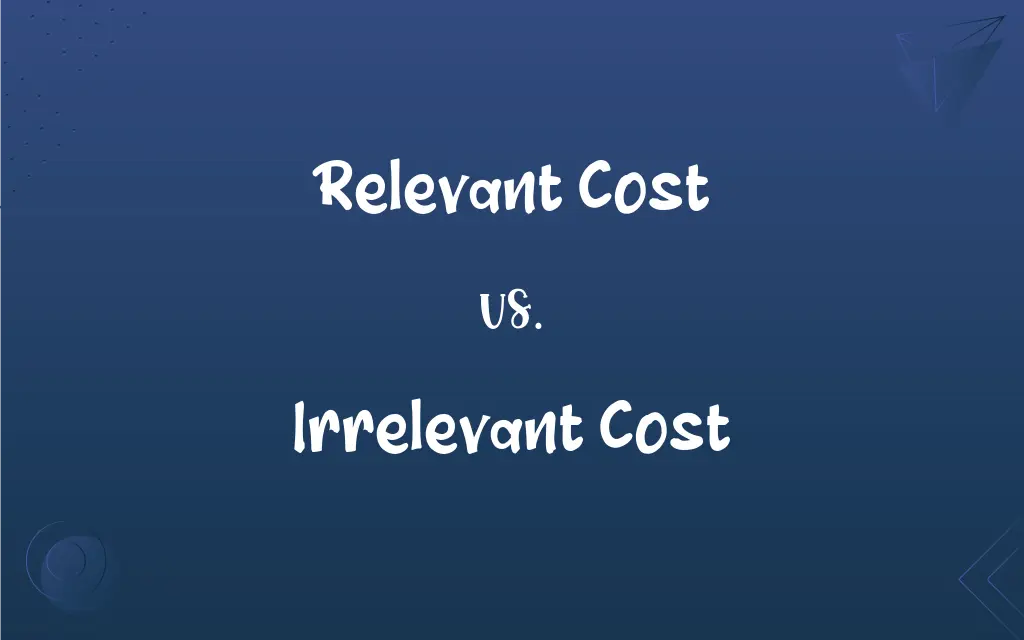Relevant Cost vs. Irrelevant Cost: What's the Difference?
Edited by Aimie Carlson || By Janet White || Published on October 16, 2023
"Relevant Cost" affects decision-making due to future outcomes, while "Irrelevant Cost" doesn't impact future decisions or outcomes.

Key Differences
"Relevant Cost" refers to the expenses directly linked to a specific business decision. These are costs that will differ based on the outcome of the decision in question. On the other hand, "Irrelevant Cost" doesn't change regardless of the decision made, having no bearing on future operations.
Understanding "Relevant Cost" is essential for effective decision-making in business. This cost influences the outcome of a business choice. For instance, if a company is determining whether to manufacture a product or outsource it, the varying costs associated with each option are the "Relevant Costs". Conversely, "Irrelevant Cost" plays no role in such determinations. Past incurred costs, often referred to as sunk costs, usually fall into this category.
It's crucial to identify "Relevant Cost" for budgeting and forecasting. These costs provide insights into how resources will be used in the future based on certain decisions. "Irrelevant Cost", on the contrary, should be set aside during decision-making processes. Including them can skew analysis and lead to inaccurate conclusions.
Lastly, in managerial accounting, discerning between "Relevant Cost" and "Irrelevant Cost" optimizes resource allocation. Making choices based on "Relevant Cost" ensures that funds are used efficiently. Ignoring "Irrelevant Cost" in the decision-making matrix prevents wastage of time and avoids confusion.
Comparison Chart
Definition
Costs affecting specific business decisions
Costs that don't impact decision-making
ADVERTISEMENT
Influence on Future
Changes based on decision outcomes
Remains unchanged regardless of decisions
Usage
Decision-making, budgeting, forecasting
Often ignored in business decisions
Examples
Costs of materials for new projects
Sunk costs from past projects
Accounting Type
Managerial accounting
Financial accounting (as historical record)
Relevant Cost and Irrelevant Cost Definitions
Relevant Cost
Relevant Cost is future-oriented, considering upcoming expenses.
The relevant cost of expanding includes new equipment costs.
ADVERTISEMENT
Irrelevant Cost
Irrelevant Cost doesn't influence decision outcomes.
The cost spent last year on a failed project is an irrelevant cost for new ventures.
Relevant Cost
Relevant Cost varies based on different potential decisions.
The relevant cost for producing in-house may differ from outsourcing.
Irrelevant Cost
Irrelevant Cost has no bearing on future operations or expenses.
Salaries of current staff, when deciding on a new project, might be an irrelevant cost.
Relevant Cost
Relevant Cost is a cost that impacts specific decision outcomes.
The relevant cost of launching a new product includes marketing expenses.
Irrelevant Cost
Irrelevant Cost pertains to past events or sunk costs.
The initial investment in a discontinued product line is an irrelevant cost.
Relevant Cost
Relevant Cost is the avoidable cost linked with specific decisions.
The relevant cost of a new campaign includes the additional advertising fees.
Irrelevant Cost
Irrelevant Cost remains constant regardless of the business decision made.
Depreciation on old machinery is often an irrelevant cost for new product decisions.
Relevant Cost
Relevant Cost aids in evaluating different alternatives in decision-making.
When choosing between two suppliers, the relevant cost is the price difference.
Irrelevant Cost
Irrelevant Cost is often excluded from decision-making processes to avoid confusion.
The cost of an old marketing campaign is irrelevant when budgeting for a new
FAQs
What is "Relevant Cost"?
Relevant Cost is a cost that directly impacts specific business decision outcomes.
How is "Irrelevant Cost" defined?
Irrelevant Cost is a cost that doesn't influence future decision outcomes.
Why is "Relevant Cost" crucial in business?
It aids in effective decision-making, ensuring optimal resource allocation.
Are sunk costs considered "Relevant Costs"?
No, sunk costs are typically considered "Irrelevant Costs".
How does "Relevant Cost" affect budgeting?
It provides insight into how resources might be used based on certain decisions.
Is depreciation always an "Irrelevant Cost"?
Not always, but often it's considered irrelevant in decision-making processes.
Can "Irrelevant Cost" ever become relevant?
Generally no, but understanding them can offer historical context.
Are fixed costs always "Irrelevant Costs"?
No, fixed costs can be relevant if they change due to a decision.
Why is it important to distinguish between these costs?
To make informed decisions and optimize resource usage.
Do "Relevant Costs" only pertain to monetary expenses?
Primarily, but they can also refer to time and other resources.
What's a common mistake regarding "Relevant Cost" and "Irrelevant Cost"?
Including irrelevant costs in decision-making, leading to skewed analyses.
How do these costs relate to managerial accounting?
They're central to it, guiding decision-making and resource allocation.
Can "Relevant Cost" change over time?
Yes, as business conditions and decisions evolve.
Can "Irrelevant Costs" be completely ignored?
In decision-making, often yes, but they can be important for other purposes.
How do these costs help in forecasting?
Relevant Costs provide a basis for predicting future expenses based on potential decisions.
What's an example of a "Relevant Cost" in project management?
The cost of materials needed for the project.
In what situations is "Irrelevant Cost" useful?
For historical understanding and financial reporting.
Why might companies mistakenly focus on "Irrelevant Costs"?
Due to emotional attachments or lack of clear decision-making frameworks.
How do these concepts help in cost-benefit analysis?
They allow for a focused evaluation of costs directly related to decisions.
Are variable costs always "Relevant Costs"?
Often, but not always; it depends on the decision context.
About Author
Written by
Janet WhiteJanet White has been an esteemed writer and blogger for Difference Wiki. Holding a Master's degree in Science and Medical Journalism from the prestigious Boston University, she has consistently demonstrated her expertise and passion for her field. When she's not immersed in her work, Janet relishes her time exercising, delving into a good book, and cherishing moments with friends and family.
Edited by
Aimie CarlsonAimie Carlson, holding a master's degree in English literature, is a fervent English language enthusiast. She lends her writing talents to Difference Wiki, a prominent website that specializes in comparisons, offering readers insightful analyses that both captivate and inform.







































































